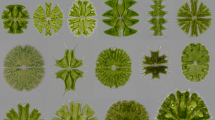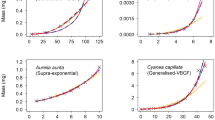Abstract
A STUDY of relative growth in the pistol-crab, Alpheus dentipes1, has disclosed an interesting modification of the simple heterogony law, as expressed by the relation y = bxk, where y and x are magnitudes of organ and body respectively, and b and k are constants, k representing the coefficient of growth-partition between organ and body2.
This is a preview of subscription content, access via your institution
Access options
Subscribe to this journal
Receive 51 print issues and online access
$199.00 per year
only $3.90 per issue
Buy this article
- Purchase on Springer Link
- Instant access to full article PDF
Prices may be subject to local taxes which are calculated during checkout
Similar content being viewed by others
References
Dawes, Ben, (a) Arch. Entw. Mech., 130, 649; 1933. (b) ibid., 1934, (in press).
Huxley, J. S., "Problems of Relative Growth", pp. 11, 31, London: Methuen. 1932.
Huxley, J. S., J. Linn. Soc. (Zool.), 37, 675; 1931.
Kunkel, B. W., and Robertson, J. A., J. Mar. Biol. Assoc., 15, 655; 1928.
Hesse, R., "Ueber Grenzen des Wachstums", Jena: G. Fischer, 1927.
Author information
Authors and Affiliations
Rights and permissions
About this article
Cite this article
DAWES, B., HUXLEY, J. Rapid Growth-Rate and Diminishing Heterogony. Nature 133, 982–983 (1934). https://doi.org/10.1038/133982b0
Issue Date:
DOI: https://doi.org/10.1038/133982b0
Comments
By submitting a comment you agree to abide by our Terms and Community Guidelines. If you find something abusive or that does not comply with our terms or guidelines please flag it as inappropriate.



